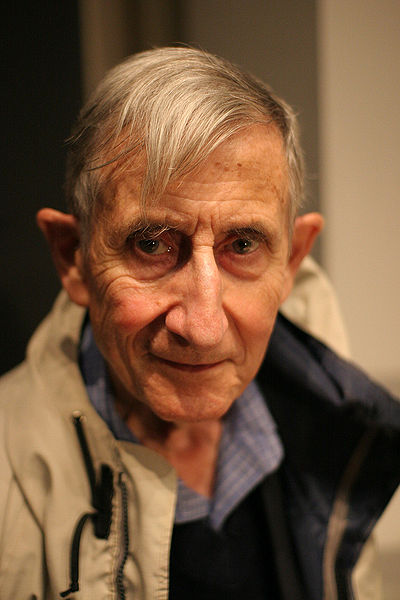 What an odd-looking person this Freeman Dyson is. His nose is long, his ears stick out, his smile is tentatively friendly, but what to make of those eyes?
What an odd-looking person this Freeman Dyson is. His nose is long, his ears stick out, his smile is tentatively friendly, but what to make of those eyes?
Dyson is hard to describe: he’s not like anyone you’ve met before and whatever he says is not what you’ll expect him to say. He’s spent his career and so far, his retirement, in one of the most intellectually-rarified places on the planet, the Institute for Advanced Study. But he doesn’t have a PhD – he says that doctoral students end up middle-aged, over-specialized, trapped, discouraged, and mentally deranged; and not having a PhD is “a badge of honor.” He’s extremely smart and the few people smart enough to understand just how smart he is, are generally in awe of his intelligence. His manners are exquisite and never fail; in conversations he’s omnivorously interested and listens with a sort of stunned joy, surely this person is about to say something delightfully original. He is the subject of profile after profile after profile, some startlingly good. One of the latest is in The Atlantic, and I’d like to suggest it’s incomplete – an easy shot since every profile is by nature incomplete. But still.
 I know Dyson because I’ve interviewed him for a book I wrote about Jason, an unusual group of scientists to which he belongs, and because now and then I run across him socially. The problem in profiling Dyson is his one-off-ness; you can’t categorize the unique. He’s a card-carrying physicist who likes astronomy better than string theory because astronomy is more real; who invents one outrageous but more or less workable space vehicle after another; who believes that extrasensory perception could be possible; and who doesn’t believe that climate change is necessarily a danger; and who publishes all this contentiousness in high places.
I know Dyson because I’ve interviewed him for a book I wrote about Jason, an unusual group of scientists to which he belongs, and because now and then I run across him socially. The problem in profiling Dyson is his one-off-ness; you can’t categorize the unique. He’s a card-carrying physicist who likes astronomy better than string theory because astronomy is more real; who invents one outrageous but more or less workable space vehicle after another; who believes that extrasensory perception could be possible; and who doesn’t believe that climate change is necessarily a danger; and who publishes all this contentiousness in high places.
His membership in Jason means that he works on problems interesting to the defense department. But his chapter in Disturbing the Universe on his service as a teenager doing calculations for the RAF Bomber Command is an eloquent and effective argument against war. He’s the most mathematical – that is, the most theoretical – of theorists, which puts him at the top of physicists’ intellectual hierarchy with experimentalists near the bottom. But he says,”all the really smart things in physics are done by experimenters. They’re a lot smarter [than theorists].”
During the Vietnam War, he helped initiate a Jason study on using tactical nuclear weapons, that is, not the big bombs that blow upwhole cities, but the little ones that blow up harbors and camps. The study examined tac nukes’ use and likely effectiveness, a cold-blooded, impartial, technical analysis. Was staying away from the ethical implications difficult? “No,” Dyson said flatly, meaning, of course not: ethical and technical analyses are different things, easy to separate one from the other. As it happened, the Jasons showed that tactical nuclear weapons would be a bad idea because our side offered much better targets than the other side. And if they’d found that using tactical nuclear weapons was a perfectly good idea? No problem again, said Dyson, go with the ethical: “We probably would have then kept quiet and not said anything.”
Which brings me back to the beautifully-written profile in The Atlantic, whose last line sums up the profile’s point, that Dyson is “emotionally incapable” of seeing the human component of the climate problem; that he sees only the sweetness of the technological fix, and not the abyss to which our technology and science are taking us. I have no idea whether the author is right or not. The Faustian scientist-type does sound stupider than you’d think Dyson would be. Dyson wrote in the first chapter of Disturbing the Universe – the book he says he thought hardest about — “We are scientists second and human beings first. We become politically involved because knowledge implies responsibility.” Maybe technological fixes are the way a technologically-inclined person takes responsibility? I have no idea.
 My point is, Dyson is noncompliant, complicated, and contradictory. An interesting profile of him might find the frame of reference in which his complications don’t contradict each other, in which they fit together and make sense. That is, it might show him in his own reference frame. My point is, if you’re trying to understand a Tanzanian Hildebrandt’s starling, don’t call it a blackbird. Go to Tanzania and figure it out.
My point is, Dyson is noncompliant, complicated, and contradictory. An interesting profile of him might find the frame of reference in which his complications don’t contradict each other, in which they fit together and make sense. That is, it might show him in his own reference frame. My point is, if you’re trying to understand a Tanzanian Hildebrandt’s starling, don’t call it a blackbird. Go to Tanzania and figure it out.
_______
Credits:
Dyson: Jacob Appelbaum
bicycling diver: with the kind permission of Rob Jan
fractals: Lumiago
Hildebrandt’s starling: Noel Feans

Thank you for an insightful summary of Dyson’s character. I was privileged to have lunch with him at the Institute and talked for more than three hours with him about every conceivable topic, from socialism to cosmology to genetic engineering. I can vouch that he is the opposite of dogmatic and is always willing to hear your side. It’s unfortunate that climate change proponents have exaggerated his interest and opinions about climate change, a topic that occupies very little of his time.
I was also delighted to confirm your observation that he looks “stunned” to see you, as if he were looking at you with wonder, parsing an exotic creature from another planet.
One reason people who are concerned about climate change (they’re not “climate change proponents”) are so focused on Dyson’s views is that they were highlighted in that New York Times magazine profile, and made to look like part of his quirky genius.
When someone is presented as having otherworldly intelligence and also as doubting climate science, the fact that he’s pretty clueless about it is not what most readers take away. No wonder people were exercised.
I was speaking with a colleague of Dyson’s– a very eminent astrophysicist– about this issue. He said: “Freeman is very very clever. But not wise.”
On the topic of climate change, this is demonstrably true.
Thanks for commenting, Mike. Your own post about Dyson (which mine linked to) was part of what I was thinking about when I wrote this one. I think of Dyson as one of a number of physicists giving opinions with varying amounts of credibility on fields in which they’re not trained.